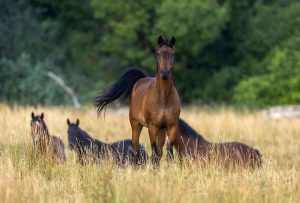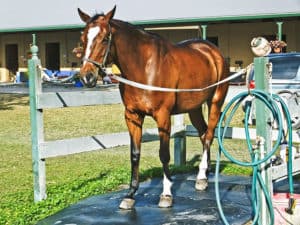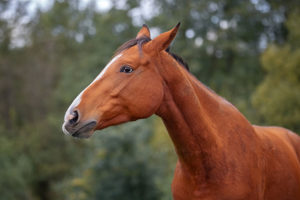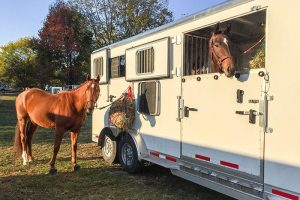
How Stress Affects Your Horse
Many situations horses face lead to chronic stress, which can result in changes in health and behavior.

Many situations horses face lead to chronic stress, which can result in changes in health and behavior.

Horse show environments can put sport horses at risk for developing skin problems. Learn what causes common skin issues and how to return horses to top form.

Can you see the signs of stress? Equine behavior experts share what to look for in your horse.

New research shows that veterinarians might need to allow several hours between transportation and testing for conditions such as PPID.

The steps you take to care for your horse both immediately after a competition and once you’re back home are important to his athletic longevity.

Feeding hay before loading your horse on the trailer can help prevent gastric ulcers from developing during long-haul travel.

Researchers found that feeding a certain prebiotic product prior to transport and exercise reduced dysbiosis and leaky gut syndrome.

Learn more about equine asthma, acute respiratory infections, and shipping fever in horses.

This inflammation of the lungs most commonly affects foals, but that doesn’t mean your mature horse isn’t at risk.

Researchers reflect on horse trailer design and long-distance travel as they affect stress in horses.

Feeding hard-working endurance horses is as much art as it is science. Our sources walk you through an endurance horse’s diet, from conditioning to post-race.

Three top sports medicine veterinarians say the best way to stay competitive is by developing a proactive approach to managing every aspect of your horse’s health and soundness.

Dr. Amanda Adams and Erica Jacquay of the University of Kentucky describe new research on how horses of all ages respond to transport—even just trips of 1.5 hours.

University of Kentucky researchers are conducting a survey to gain a better understanding of the purposes and ways horses are transported.

An Italian researcher outlines the stresses high-performance horses face during transport and what horse owners and managers can do to help.

An owner wants to know how to best prepare her senior horse for a move from Florida to Virginia. Dr. Chrissie Schneider offers advice.
Stay on top of the most recent Horse Health news with
© 2022 Copyright Statement dolor sit amet, consetetur sadipscing User Terms, sed diam nonumy eirmod tempor invidunt ut labore et dolore magna aliquyam erat, sed diam voluptua. At vero eos et accusam et justo duo dolores et ea rebum. Stet clita kasd gubergren, no sea takimata sanctus est Lorem ipsum dolor sit amet.
"*" indicates required fields